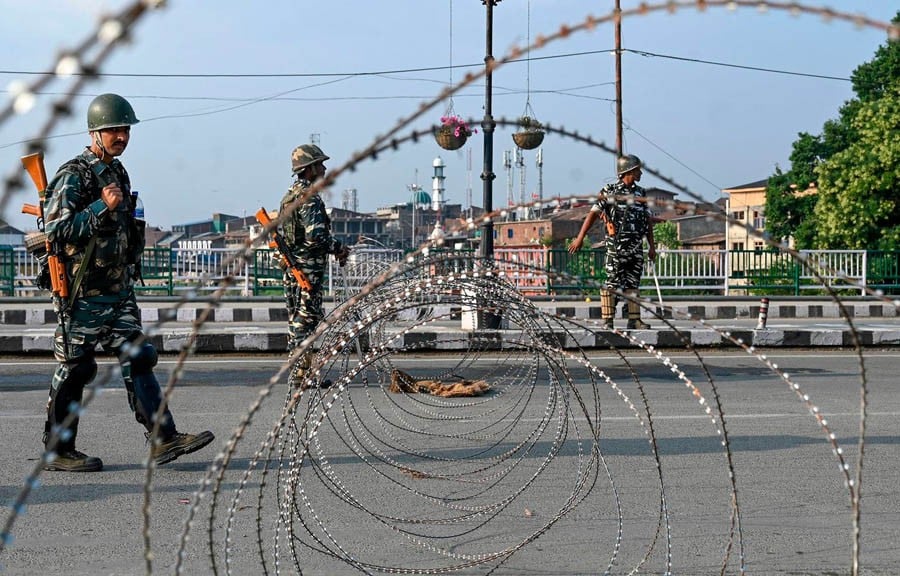
The Indian move to revoke Article 370 has plunged the whole Jammu and Kashmir into chaos

The revocation of Article 370 of the Indian constitution to abolish the autonomous status of the Indian-held Jammu and Kashmir has caused an enormous uproar across Jammu and Kashmir as well as India and Pakistan. It has also drawn strong reactions from the world capitals and international human rights organisations. The calculated move by New Delhi has brought the Kashmir issue to the fore in the media limelight after a long time.
The way India has scrapped Article 370 and abrogated the internal autonomy of the Indian held Kashmir can be called anything but democratic. The Kashmir sate administered by India has been turned into a garrison and citizens forced to stay inside the four walls of their houses to prevent massive protests against the decision. The unprecedented restrictions on free movement and speech illustrate that the decision was unilateral, arbitrary and lacked public backing.
Those living along the nearly 700-km-long Line of Control between Indian-held Kashmir and Azad Jammu and Kashmir are facing the brunt of the fast escalating tensions between the arch rivals. The Neelum Valley, which hosts almost half a million tourists from across Pakistan, has become the target of Indian shelling during the last couple of weeks. Two people have been killed and over a dozen have been injured.
Sadly, cluster bombs are being used in the Neelum Valley to scare away tourists and target locals. This is a violation of the Geneva Convention. Although India denies this, images of the damaged houses have been widely shared on the social media, telling horrifying tales of misery caused by these bombs.
Guest houses are empty, employees are scared and businesses are closing down due to shelling from across the LoC. Since the 2003’s ceasefire along the LoC, tourism in the Neelum Valley had picked pace. Local people have invested heavily in the hospitality industry. Authorities say that 500 guest houses are registered with the Guest House Association and almost Rs 1.5 billion investment in the Neelum Valley has been recorded so far. Young people who used to move to the plains of the Punjab and Sindh for jobs are now working locally and earning handsomely. People living along the LoC, particularly women, are scared of going out for work due to shelling from the Indian posts. Schools are shut down and farmers are unable to look after their livestock.
Trade along the LoC, which was marketed as a great confidence-building measure (CBM), was suspended in April this year. Despite persistent requests and protests, it has not resumed. Trader leaders tell TNS that due to the unexpected suspension of trade, they have lost millions of rupees and there is no mechanism is in place for recoveries as trade across LoC is being done on the basis of ages-old barter system.
On the Indian side, the National Investigation Agency has summoned traders to its offices for financial scrutiny and to investigate their alleged links with militant outfits. The entire community is under threat and unable to pay the outstanding dues of their counterparts in Azad Jammu and Kashmir.
Also read: Options for Pakistan
The LoC was also opened for the divided families in 2005. Now it is also closed at Muzaffarabad-Chakothi crossing point on the historic Muzaffarabad-Srinagar road. Nearly 40,500 divided families have travelled without a visa through the LoC since the inception of this facility in 2005. Now, dozens of families are stranded on both sides. This has further reduced the people-to-people contacts.
The new legislation by New Dlehi has rung alarm bells in Azad Jammu and Kashmir. No one knows what kind of institutional relationships between the two regions will emerge. Since 2005, people from both parts were travelling on a permit issued by the local governments but now the Indian government has made IHK a Union territory. This might badly affect the relationship between the two regions.
Indian Home Minister Amit Shah has said in Lok Sabha, "India will continue to claim the territories of Jammu and Kashmir under the occupation of Pakistan. Had our army been given freedom, all the areas would have been ours." Uncertainty prevails in the AJK region. Under the BJP government, the idea of a secular and democratic India exists no more.